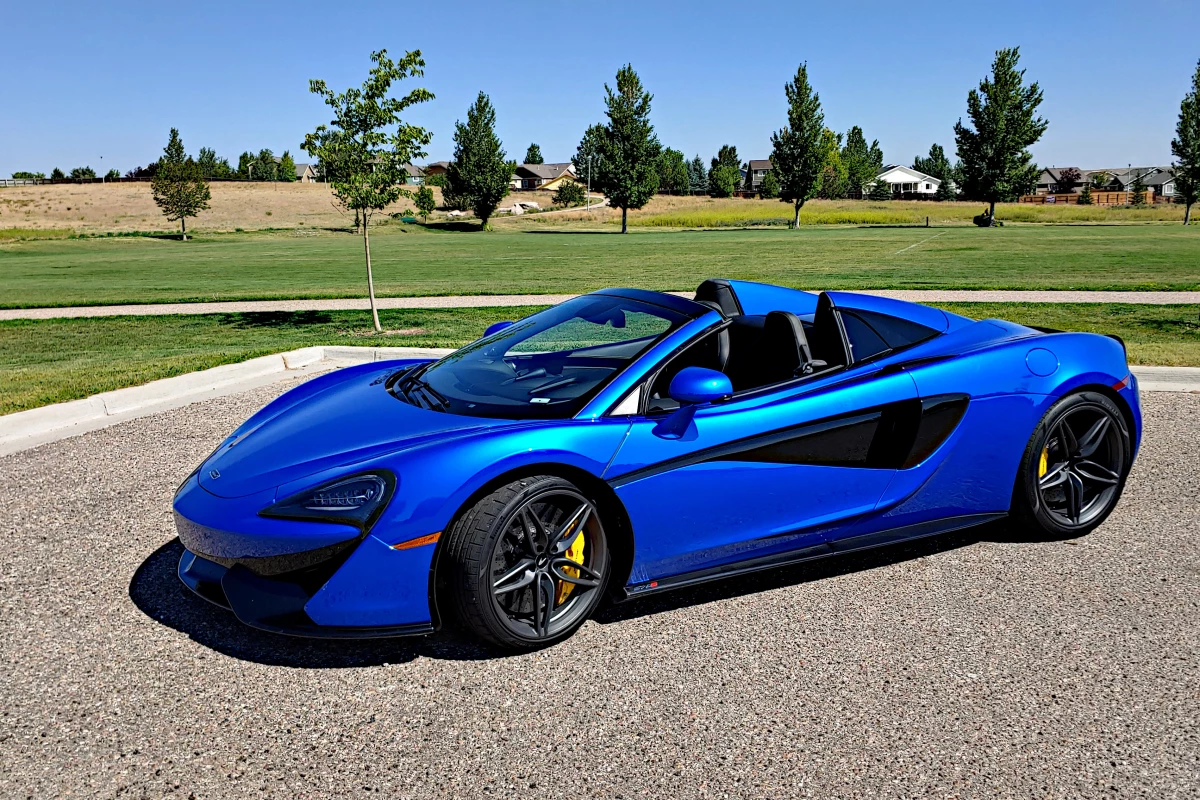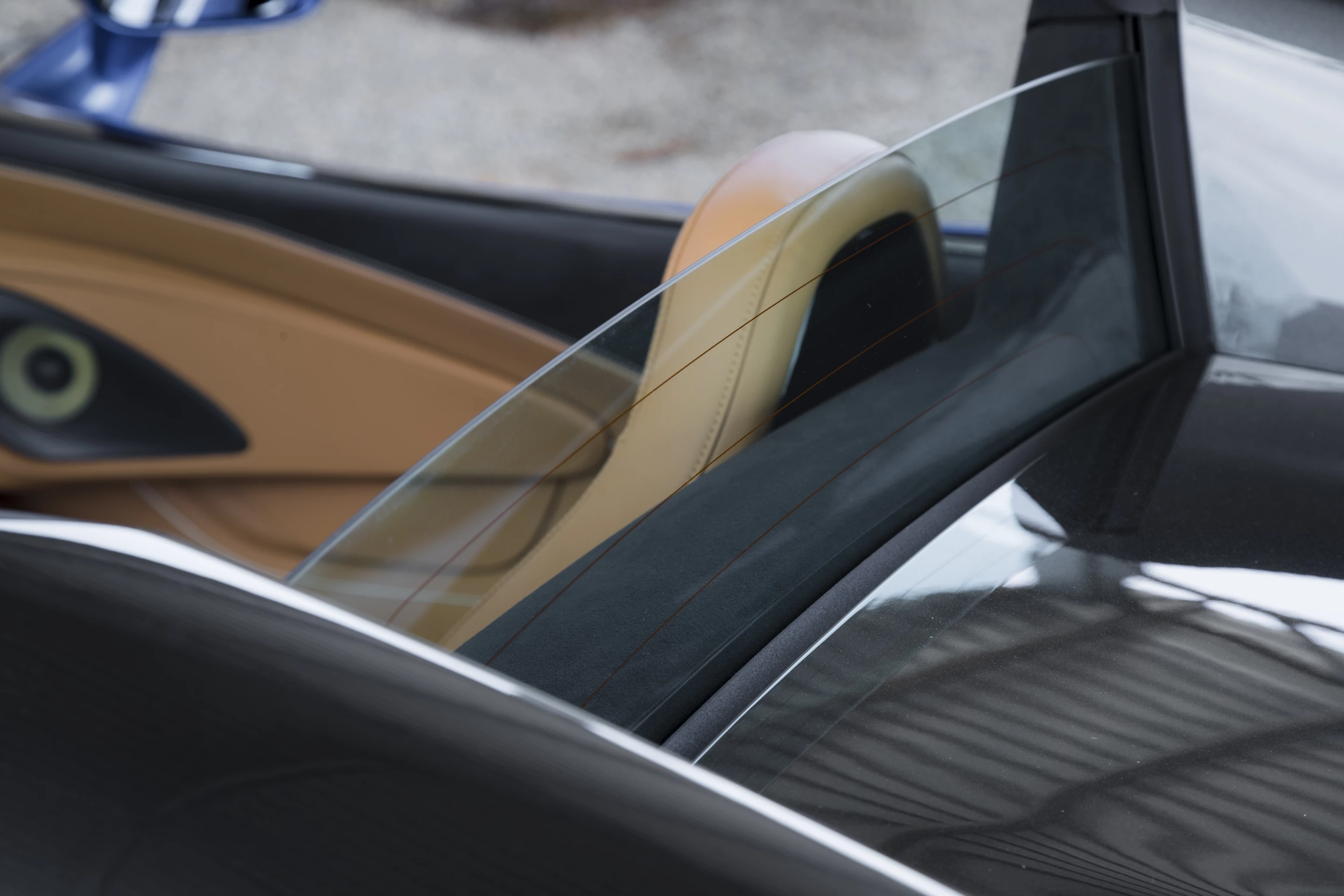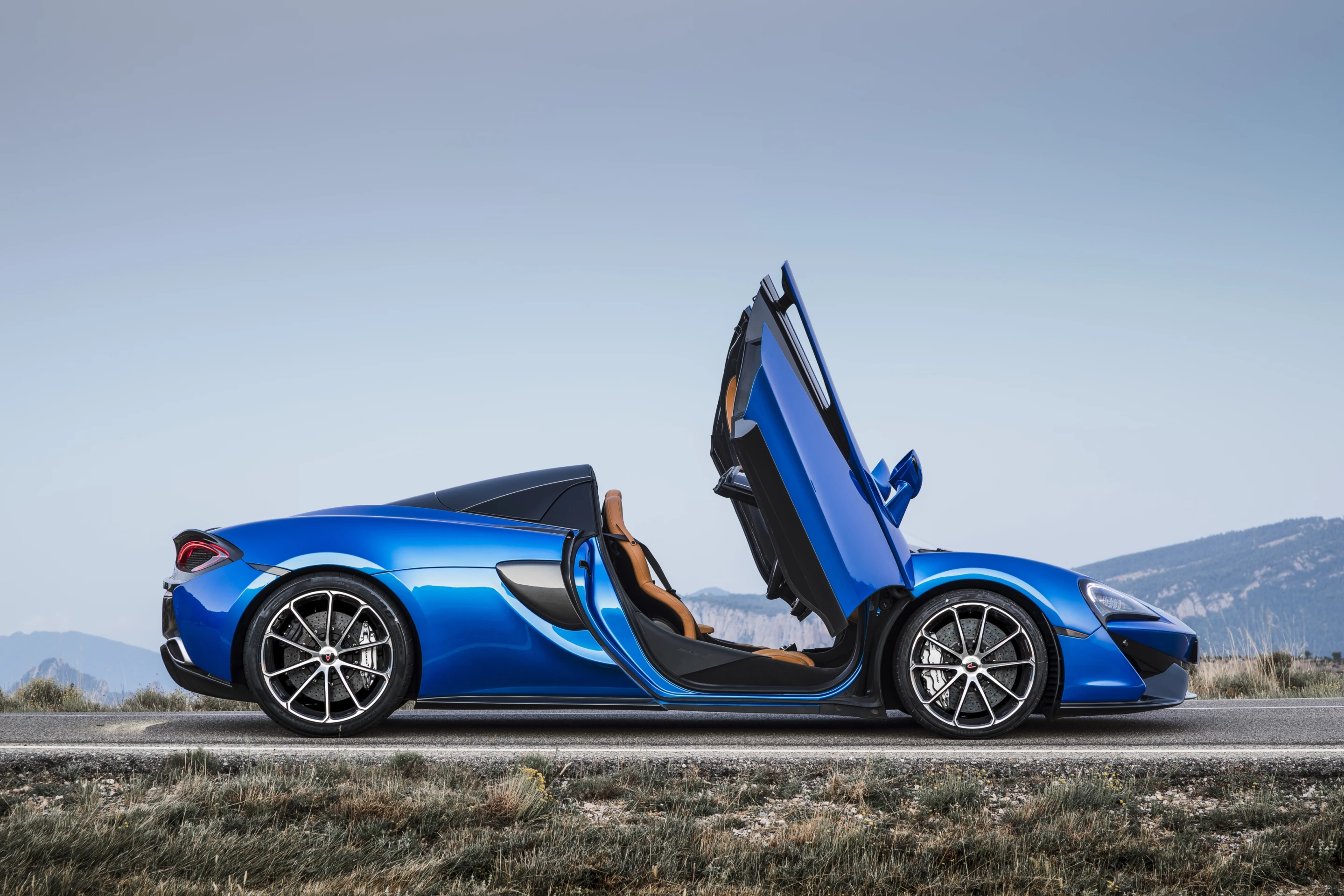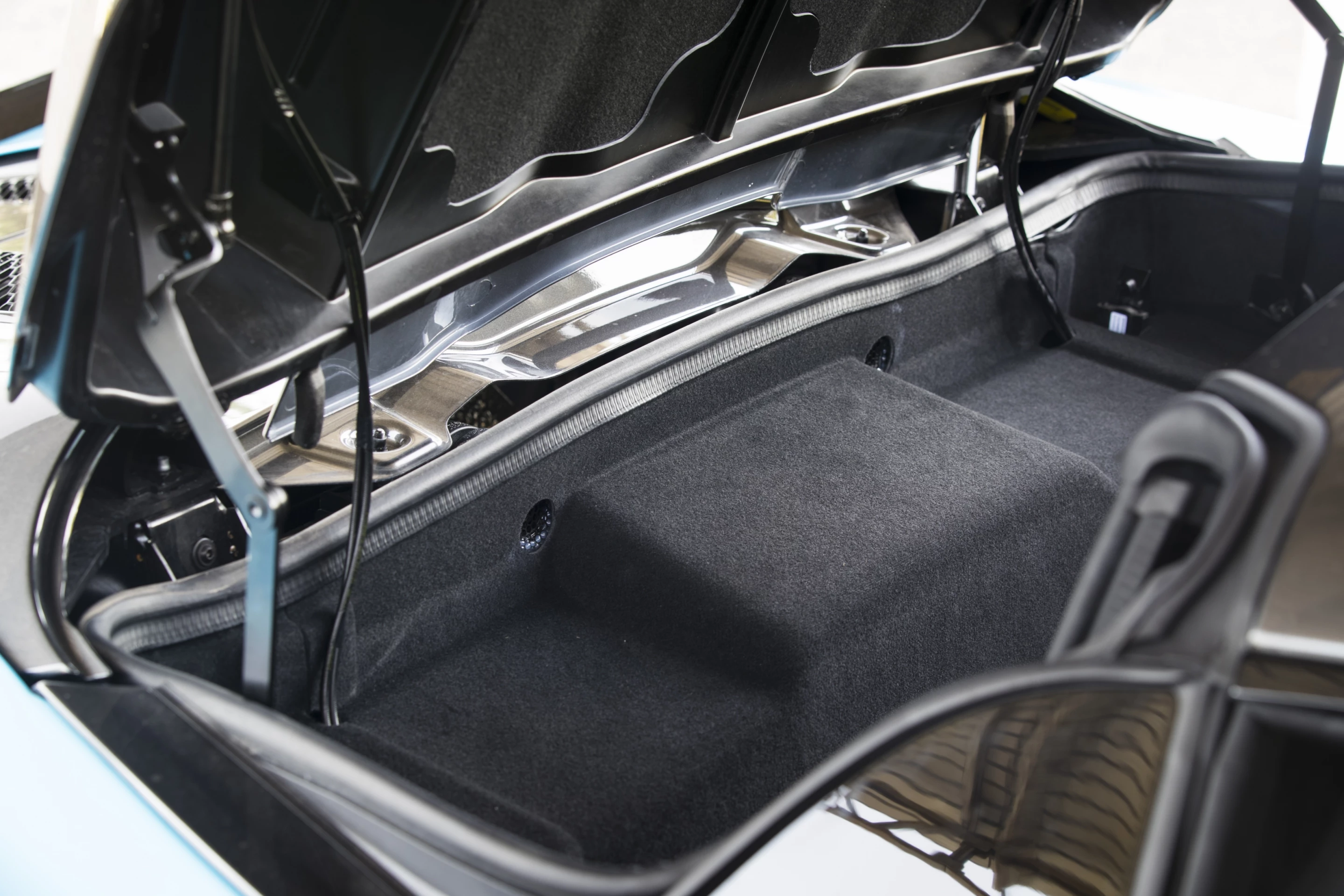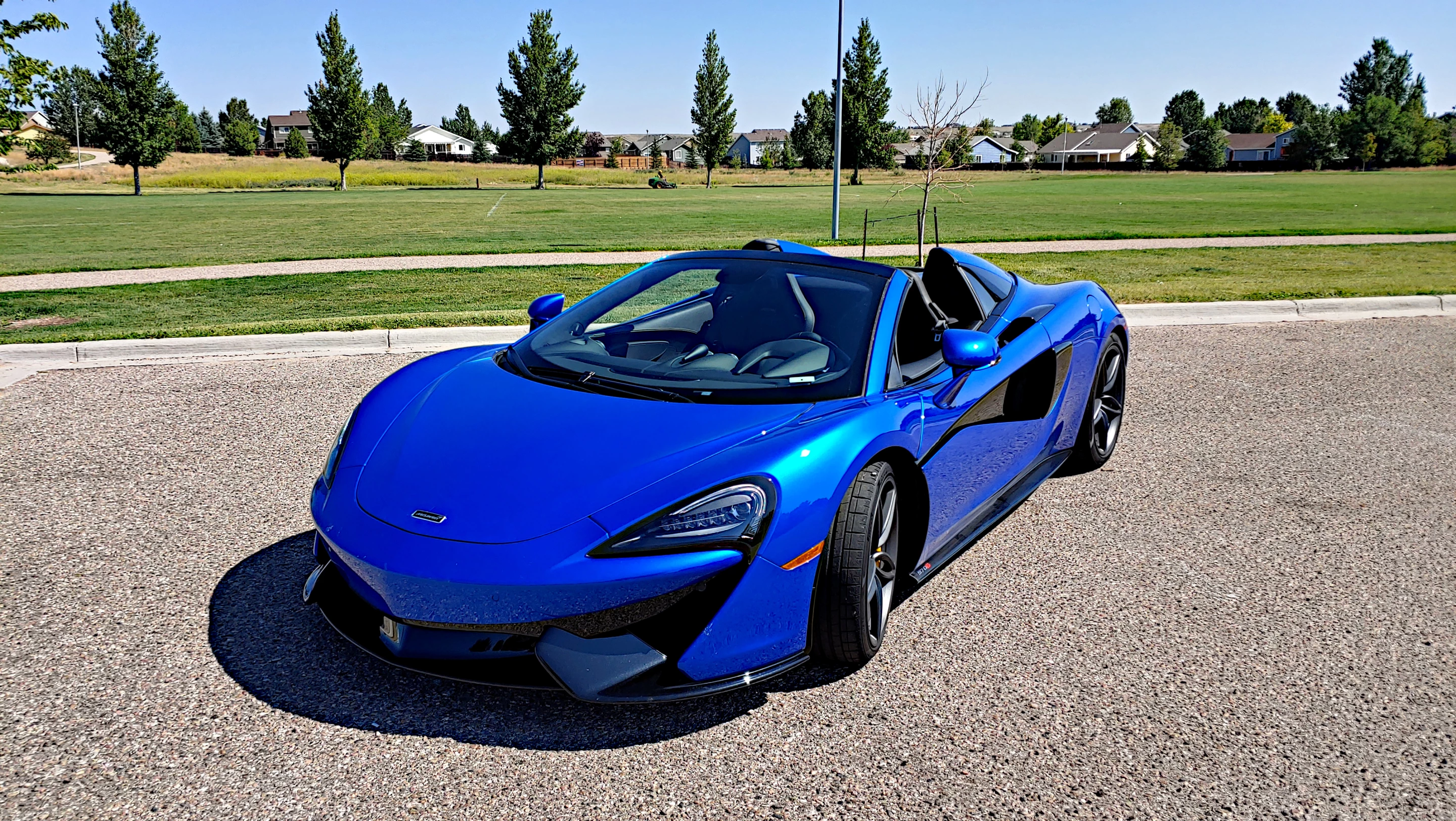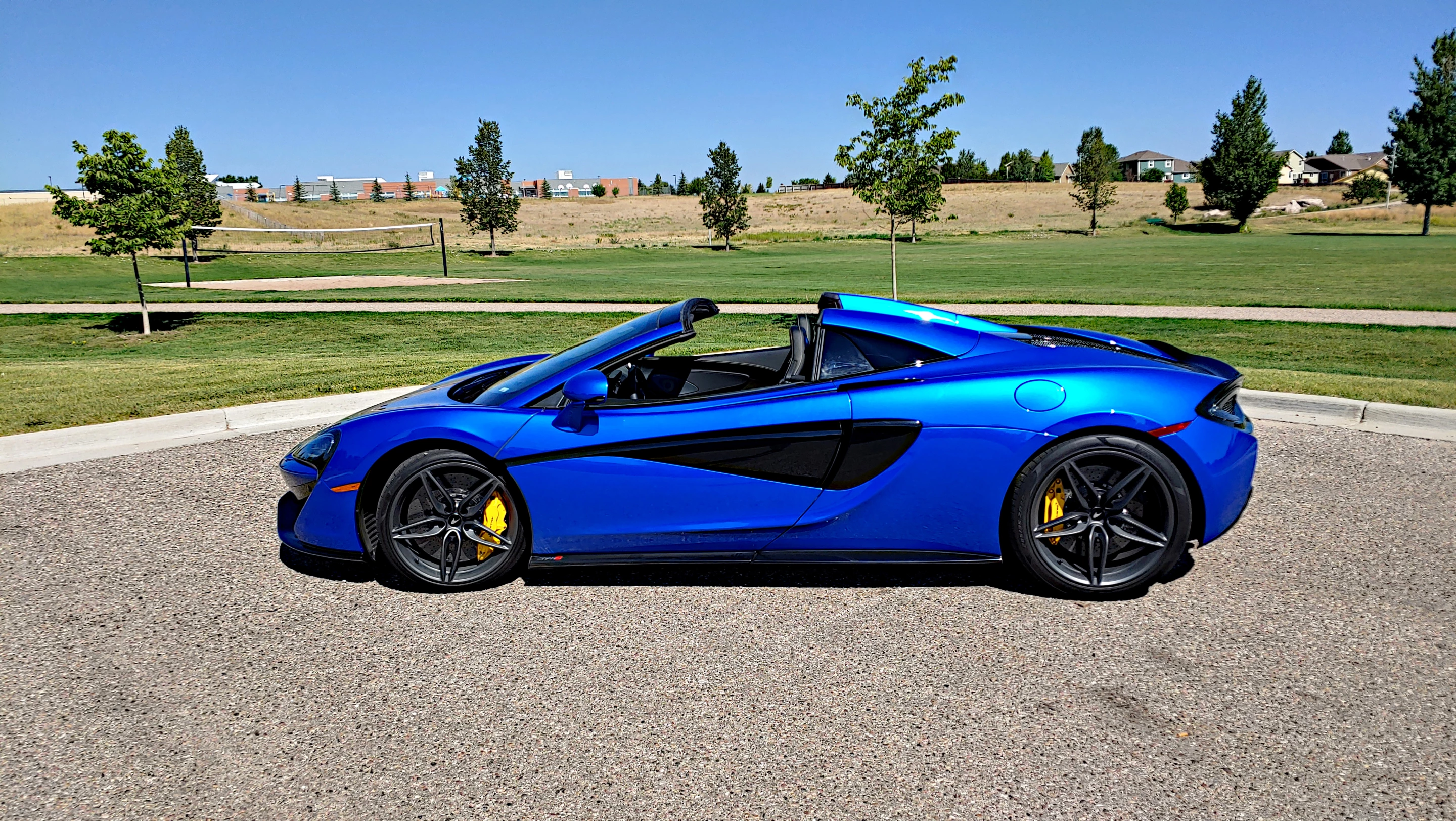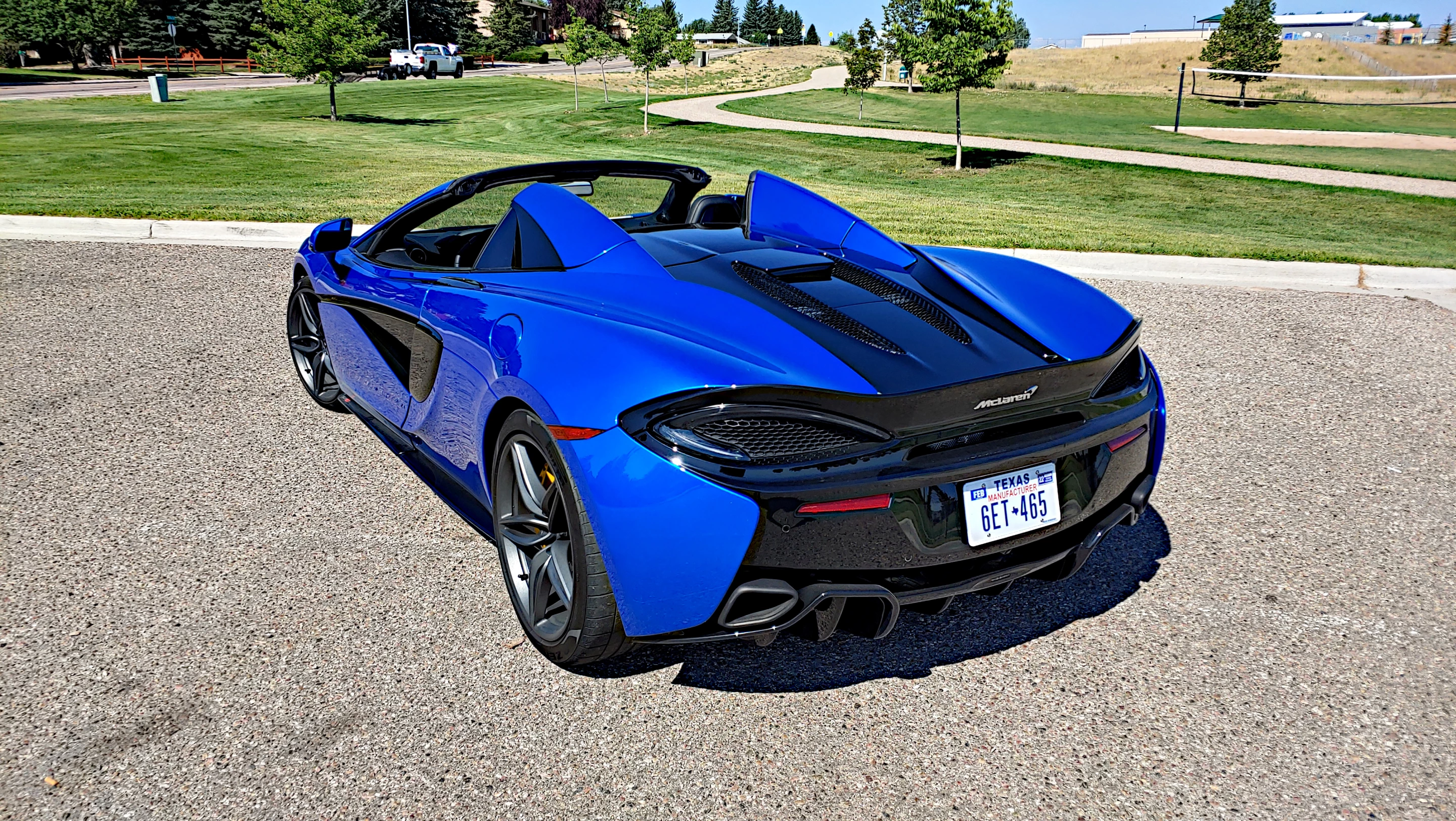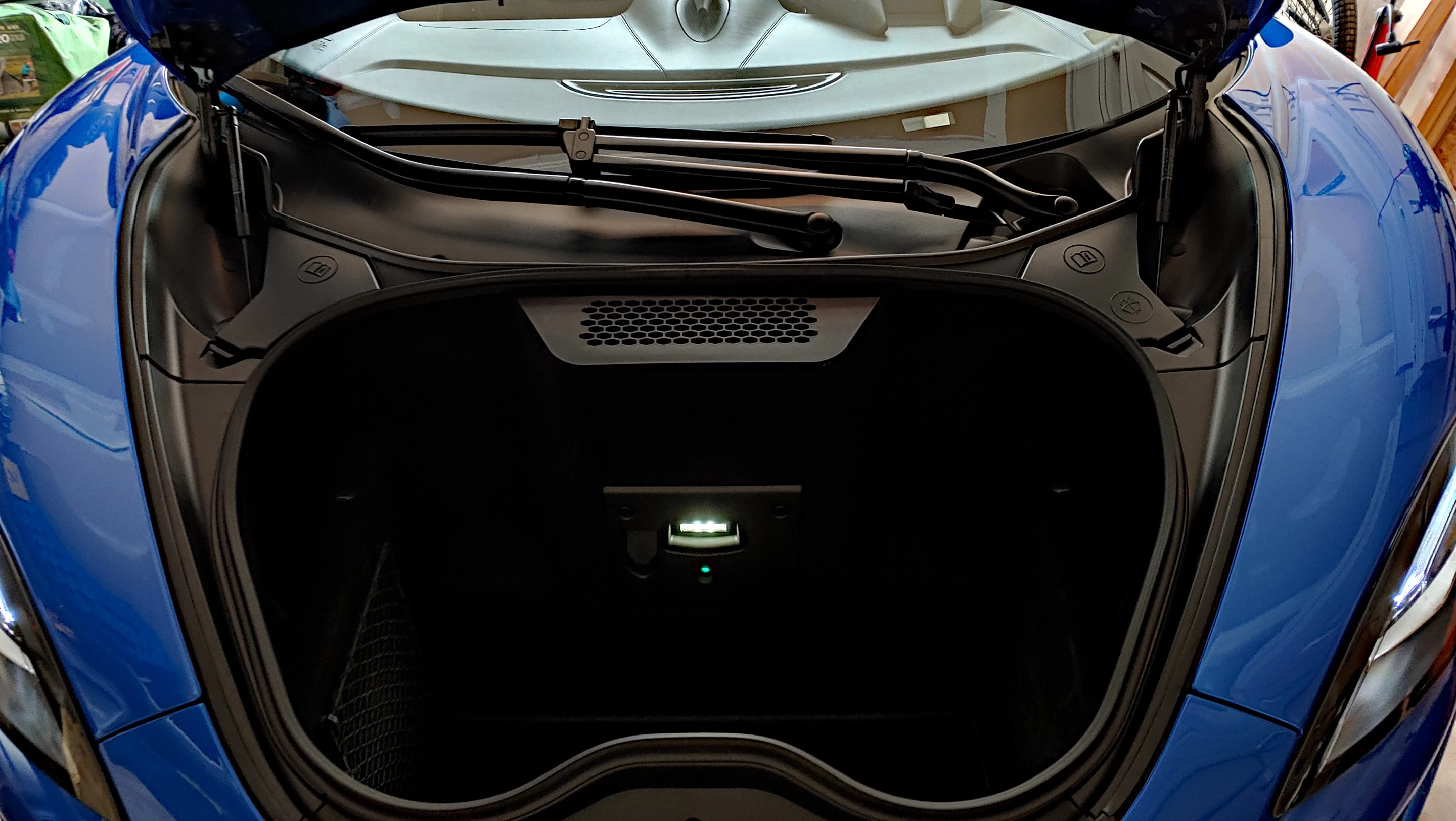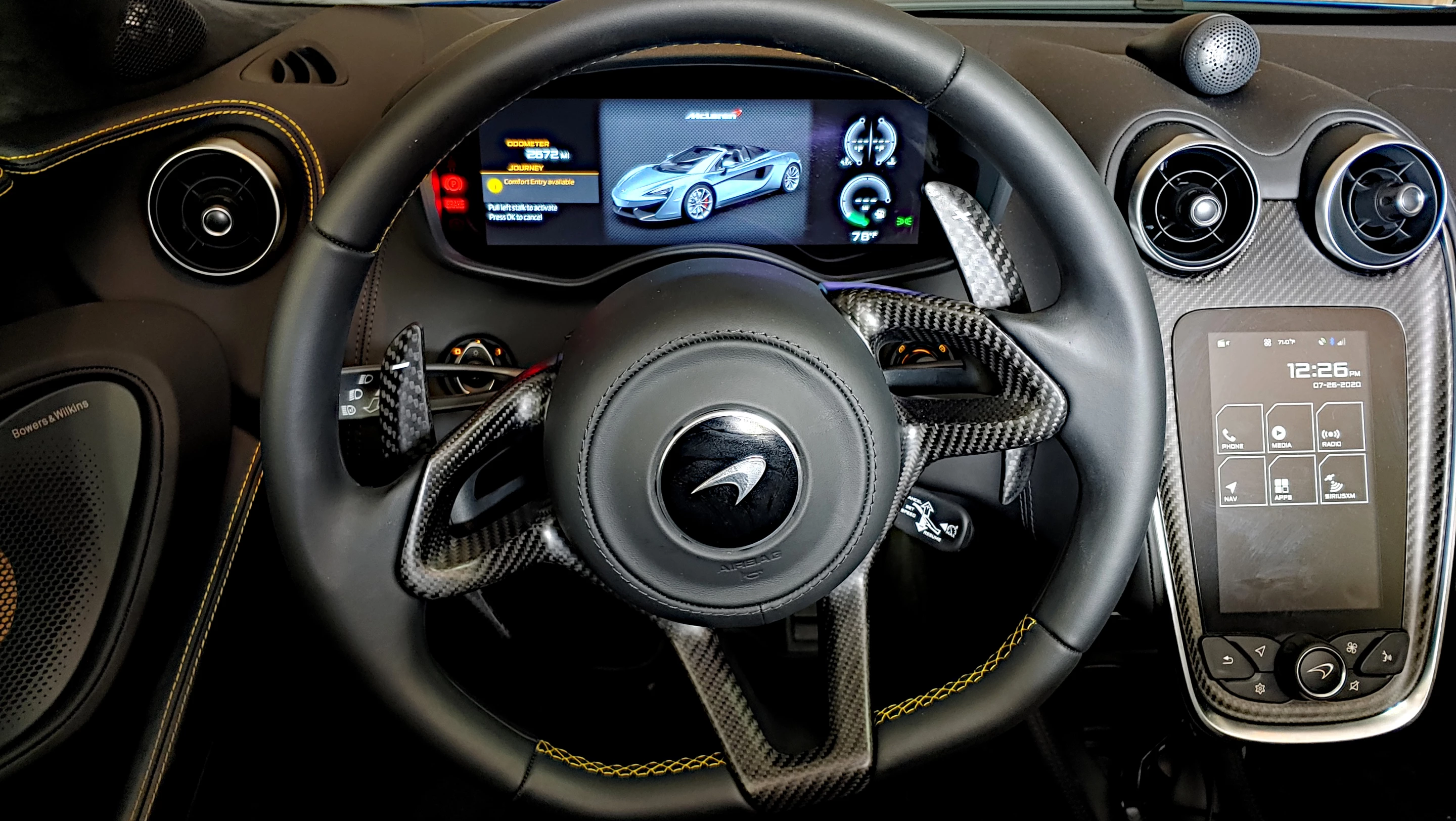The problem with supercars, is there’s always a crowd. During the several days I had with the 2020 McLaren 570S, our only alone time as a couple was in my tight, tiny garage. Once that garage door opened and the car was backed into the driveway, it was only a matter of minutes before people started showing up. Just pulling into the fuel station to add go-juice to the car meant half an hour of photo taking and answering questions. It gets brutal.
At a glance
- 3.8-liter twin-turbo, 90-degree V8 that outputs 562 horsepower
- Decidedly British engine note and very clean engine/transmission pairing
- Beautiful, flowing design with carbon fiber everything
- Unique driver controls for handling and powertrain
- A dream to drive
The celebrity-status-by-proximity is intoxicating at first, but it quickly wears thin. This, I surmise, is why middle-class folks don’t own US$233,000 cars. That price tag assumes a mansion, security fence, and probably caviar for breakfast.
But what do you get for that two hundred and thirty three grand? A lot of car. Lots of it. First, McLaren carbon fibers everything but the seatbelts, or close to it. The whole car only weighs about 3,313 pounds (1,503 kg) and is propelled by a 3.8-liter twin-turbo, dry sump lubed, all-aluminum 90-degree V8 that outputs 562 horsepower (419 kW). As a side note, doing the conversion from standard HP to metric, we get 570 PS. Hence the McLaren’s model number.
The 2020 McLaren 570S I was fending off the crowds in was the Spider model. The electrically-actuated hard-top roof articulates into the back just behind the driver. There is a Coupe model for this car, but I’m not sure why anyone would buy it. The performance numbers are almost identical in either option.
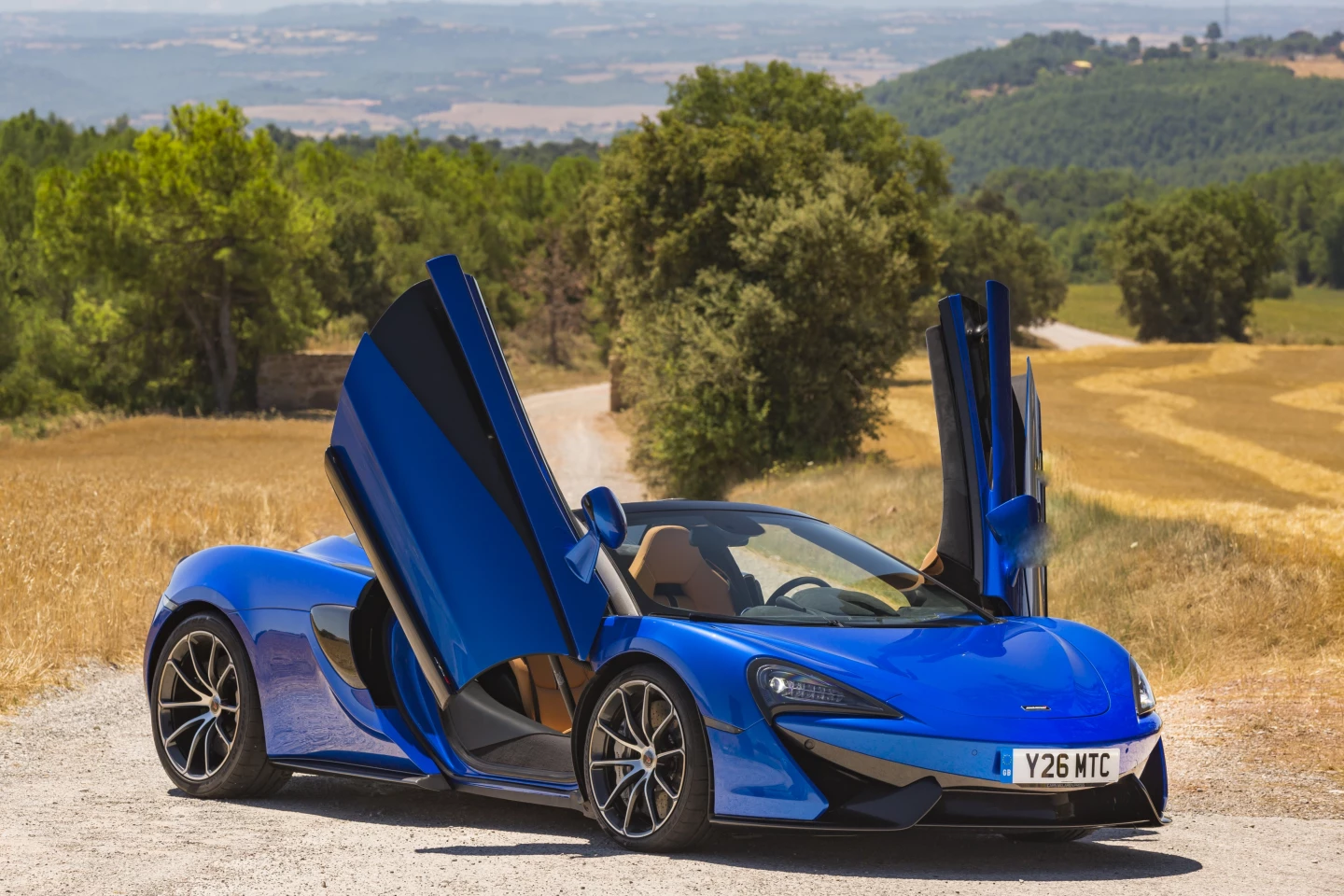
The 570S has a seven-speed, dual-clutch Seamless Shift Gearbox from McLaren that shifts faster than any human could possibly accomplish on their own. And it’s more accurate about figuring out where to be at any given moment. As an example, my 0-60 mph (0-96.5 km/h) sprint times improved from 4.4 seconds, when shifting with the paddles in forced manual mode, to 3.8 seconds when letting the transmission do it on its own. Had there been a clutch pedal involved, my time would have been even slower. As it was, an amateur like me probably can’t do much better in this car either way. A professional in this car, on a closed track with better timing equipment, could easily shave a half a second or more off those times. McLaren lists the 0-60 time for this car as about 3 seconds flat.
Most would expect a big, beefy engine like that, which sits behind the driver and over the rear axle, to produce a lot of sound. As Americans, we’re used to our performance cars trumpeting their muscle in no uncertain terms. Not so with the British. The growl coming from the 570S is a higher pitch, sans any acoustic upgrades common in large-displacement V8s. It is, in its way, a satisfying sound that promises refinement and class. Definitely very British.
The crowd pulled by the McLaren wherever it went was not attracted by the engine’s rumble, though – it's all about the extreme look of this supercar. The 570S boasts a sleek, distinct design. A few of the less informed public mistook it for the new C8 Corvette (to people like me, this is like mistaking Dwayne Johnson for Gina Carano). Most of those who were even moderate car enthusiasts knew immediately that this was a McLaren.
It begins with a shark-like front nose that splits, with aerofoils marking the lower third as dark carbon against the body paint. The hood is actually a front trunk (“frunk”) that offers room for a couple of carry-on bags, the emergency roadside kit that comes with the car, and that’s about it. There’s a plug in there for keeping the battery trickle charged during storage as well. Something that’s important with a car like this, which is likely to be parked for long periods and which has an extremely expensive lithium-ion accessory battery.
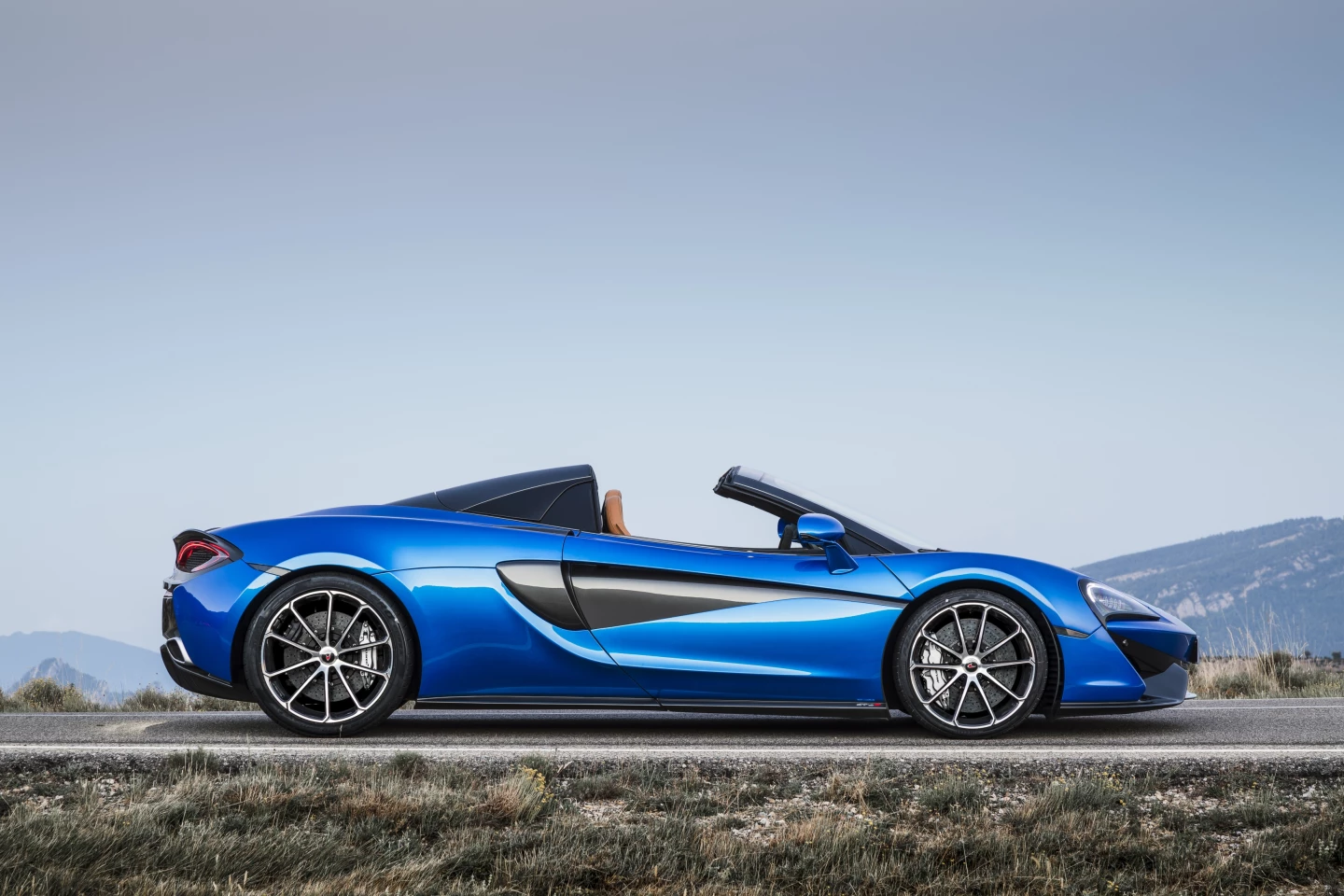
Where the 2020 McLaren 570S really jumps at people is from the side. The profile of this car is unmistakable. From that shark nose, which dips very low to the ground, the front fenders bulge slightly into a windscreen set at an angle that nearly matches the fast upward slope of the hood line, showcasing how low and wide this car really is. Behind the front wheel wells a line begins, narrow at first, and extending along the door, widening in a funnel shape towards the intake. This feeds air to the engine for power and cooling. Below that cutout funnel are bone lines and body crimps to accent the rearward airflow the car creates. Meanwhile, a belt line above all that, pulled from the fender and all the way across the 570S, becomes the huge rear haunch.
This is classic Coke bottle in carbon fiber form.
At the rear, the car abruptly cuts off – also part of that classic format – and the rear deck is decidedly flatter and beefier than the rest of the car. This lets everyone know where the engine is located and where the power goes. The rear track is two inches narrower than the front, but you wouldn't know that given the bulge of the rear flank and massiveness of the rear design in proportion to the rest of the 570S.
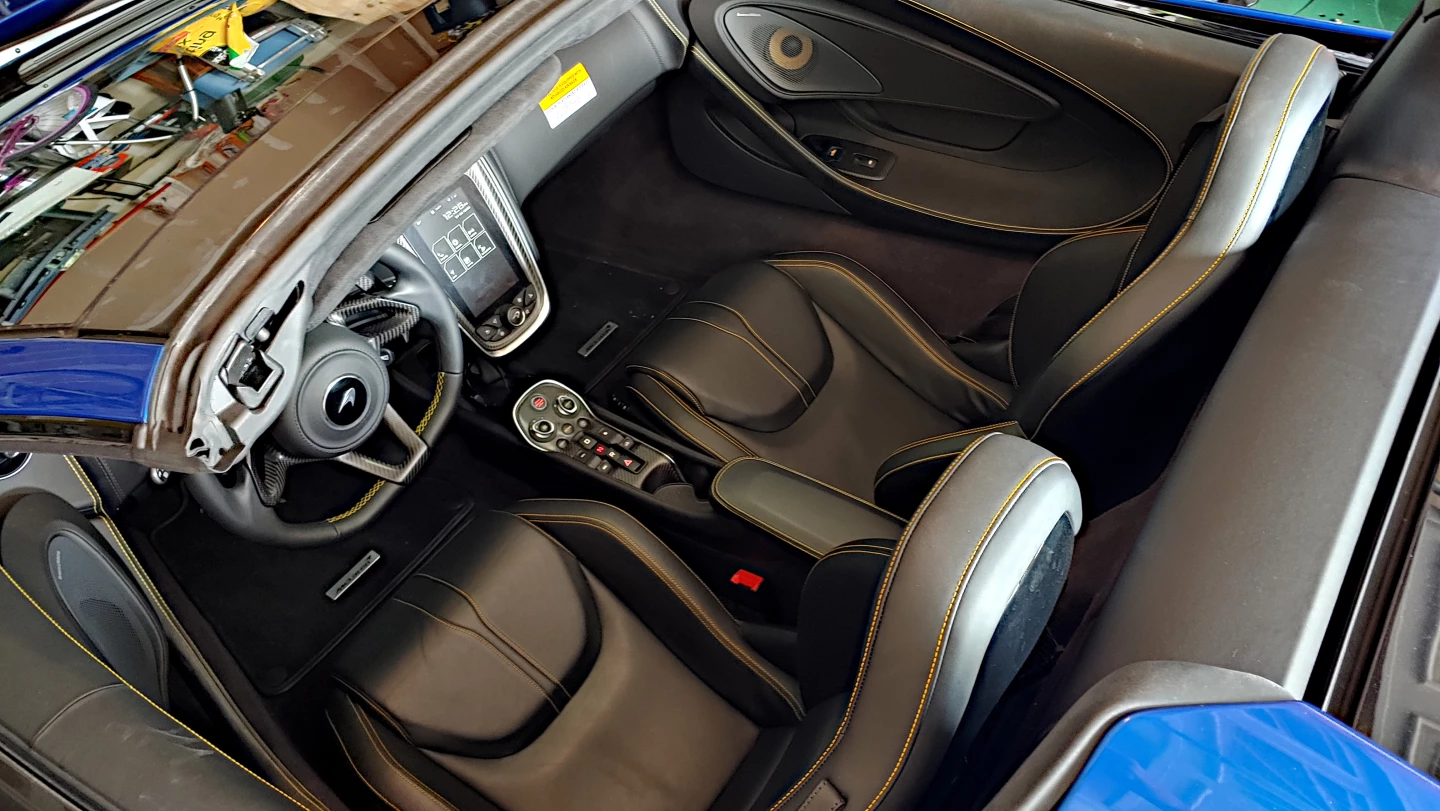
The 570S model I drove was further enhanced, visually, by several McLaren “Stealth” options such as the exhaust tips and lightweight wheels. Carbon fiber upgrades were also added, though mostly to the interior of our test model. The Vega Blue exterior paint (a $4,450 option) is the second-most expensive upgrade to the car, the first being the MSO Black Pack that contrasts it ($5,460).
For the driver and passenger, the interior of the 2020 570S is nicely appointed. In fact, my only disappointment there was the lack of cooled (vented) seats, which are just the thing in a convertible on a hot day. Everything else is beautiful. Seating is comfortable, considering this is a two-seat sports car sitting at a height commensurate with a Mazda Miata –the McLaren is actually shorter by about an inch, but the carbon fiber tub that creates the cockpit means that it has more headroom despite that.
The sport steering wheel on the 570S has a clipped bottom, race style, and large paddle shifters attached to the wheel on a rocker so that shifting can happen (up or down) from either side. The transmission runs up to 8,500 RPM or so before it redlines and, true to its sports car nature, there is no “park” option for the McLaren 570S. Instead, you place the transmission in Neutral and activate the electronic parking brakes. These are separate brake units from the Brembo brakes that otherwise stop the 570S. Aggressively, I will point out.
Most of the cockpit in the McLaren 570S is straightforward and easy to understand. Infotainment comes in the form of McLaren’s “Iris” system, which is fairly simplistic and focused more on audio and performance metrics than anything else. There was also a Bowers and Wilkins 12-speaker stereo in the car, but I honestly only used it briefly as the car’s own natural sounds were far more interesting. The crackle of exhaust farts on downshifts and the sudden roar of the V8 on acceleration after the fact were intoxicating. As was the near-silent ceramic braking, even from speed, and the amazingly serene sound as air flowed over the open cabin – a testament to the aerodynamics.
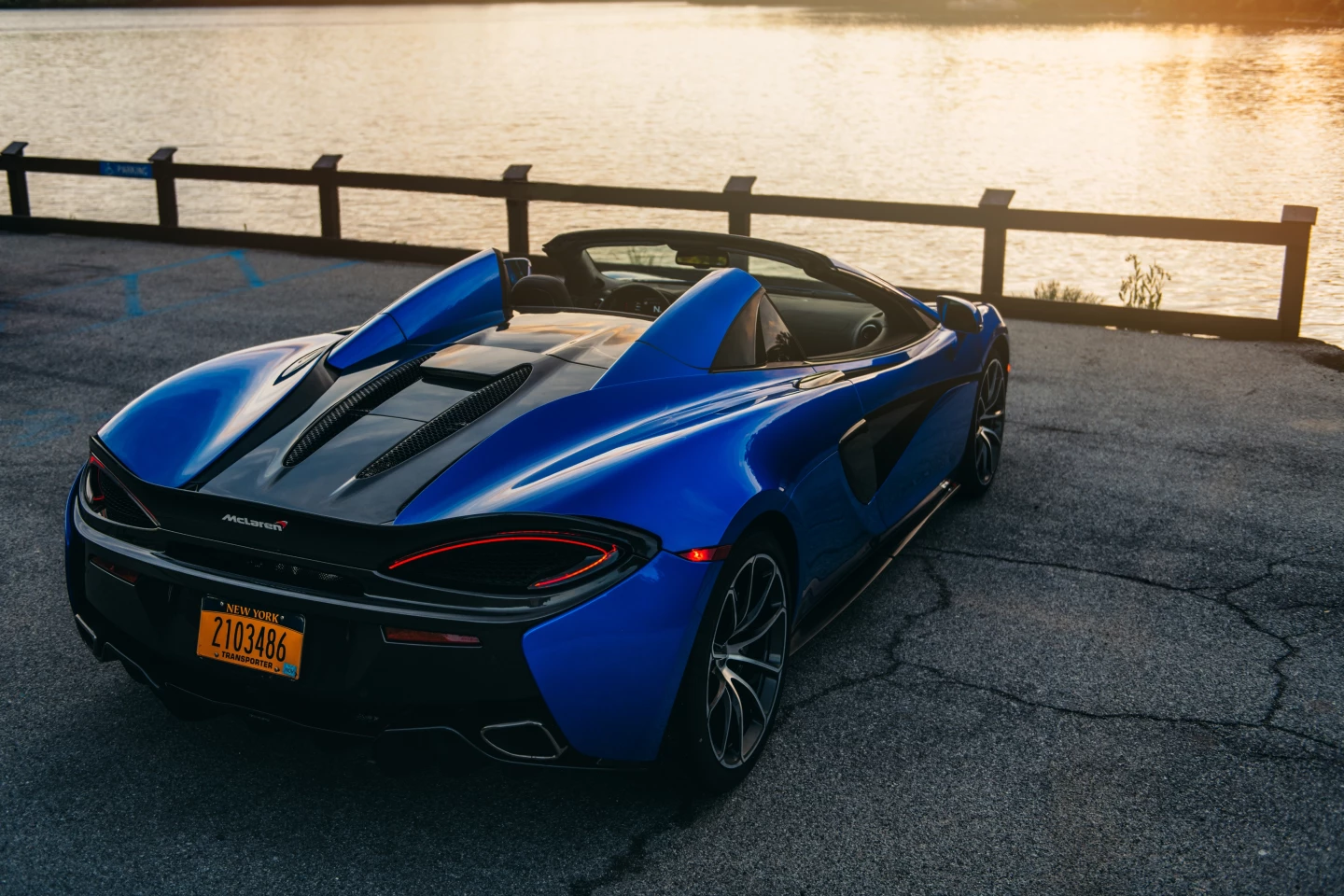
At speed, the dynamics of the McLaren really become the focus. Adaptive Damping is standard on the 570S, aiding the double-wishbone independents with three different mode options. Unique to this car, in my experience, is the ability to individually tune, on the fly, suspension and drivetrain separately. Two selector knobs, located above the transmission buttons, have three positions each.
On the left is one labeled “H”, which is for handling. Normal, Sport, and Track are the options there along with a button at center that toggles electronic stability control (ESC). In “Normal” mode, the suspension cushions more than might be expected of a sports car, but not so much that you forget you’re in a sports car. It’s a good mix of comfort and a reminder not to be too comfortable in a speeder like this.
On the right is “P” for powertrain. It too has Normal, Sport, and Track as its options. This tunes the engine/transmission to each of those three modes, which get more aggressive as you turn the knob to the right. I drove mostly in Sport mode, which opened the exhaust note a touch and gave better throttle response. Track mode is great for those who want instant reactions to every action they take and who care little about ambient sound and fuel economy, preferring a high RPM at all times. Sport is a more everyday haul buttocks mode that I enjoyed while Normal was a more sedate, but still enthusiastic option. The button in the middle of this knob activates forced manual shifting mode, giving the driver (via the paddle shifters) control of the gearing.
Below those two knobs are three more buttons. To the left is Launch Control, at middle is the active suspension toggle (turning it off), and at the right is the engine stop-start toggle. I routinely kept that off as a big V8 like this car owns is not conducive to shutdowns and startups. It’s noisy and makes the driver nervous when it happens.
The butterfly wing doors are amazing to behold and open and close with a piston-assist that takes most of the labor out of the deal. Getting into the McLaren, though, requires that one be at least moderately limber, but even a friend who’d had both hips replaced was able to get in and out of the car (eventually).
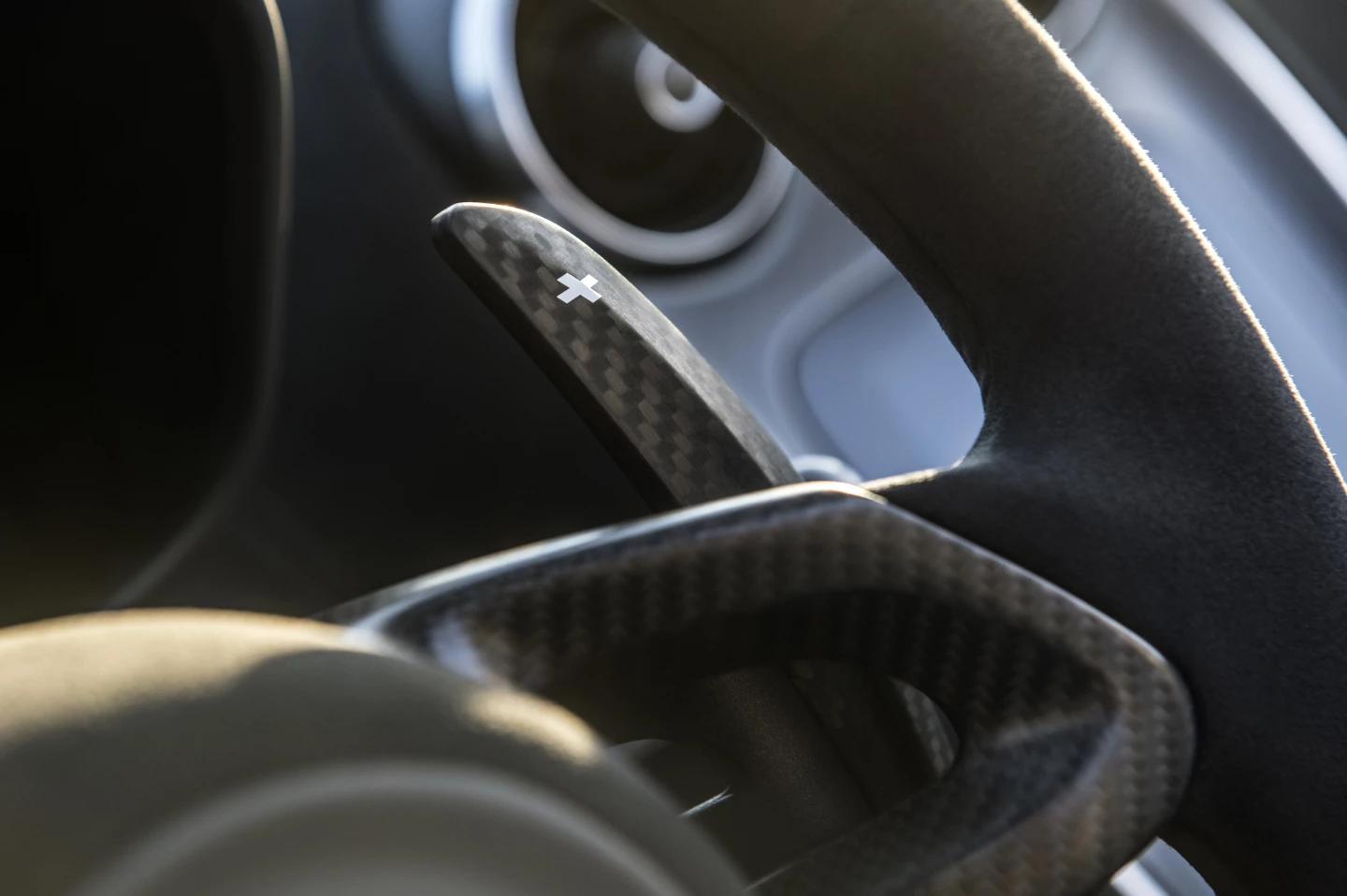
On the road, the McLaren 570S is a dream to drive. At once responsive and continually engaging, it’s also comfortable and good at touring. On the freeway, it's surprisingly smooth over long distances, though the usual sports car cramping does eventually set in. It is, after all, a tiny cockpit and a low, fast, sports car.
The issue, again, is with the crowds. This happens even on the highway. Cars will pull up, drivers or occupants will realize what they’re looking at, and then games of keeping pace, passing, slowing down, and passing again will commence as picture taking and video goes on. This also happens at every stop light and parking lot that the McLaren finds itself in. Some diehards even stalked the car, following it around apparently waiting for the 570S to stop so they can jump out and look at it.
On the other hand, the McLaren 570S is definitely a car worth stalking. It’s exotic and rare. It’s the kind of car that teenagers have on posters in their rooms, the kind that gets showcased as the hero’s car in movies, a symbol of ultimate attainment. It’s beautiful, fast, and exhilarating. Very few vehicles can match this one. The 2020 McLaren 570S is a car that most will only dream of driving. And for those who can drum up the triple-digit sums required to do so, owning one of these is never going to be a bad idea.
“If it were possible to have relations with a car and make Transformer babies, I’d want to have them with this McLaren,” I told my wife. Probably not the most marriage-enhancing way to introduce a vehicle, but it was from the heart.
Product Page: 2020 McLaren 570S
